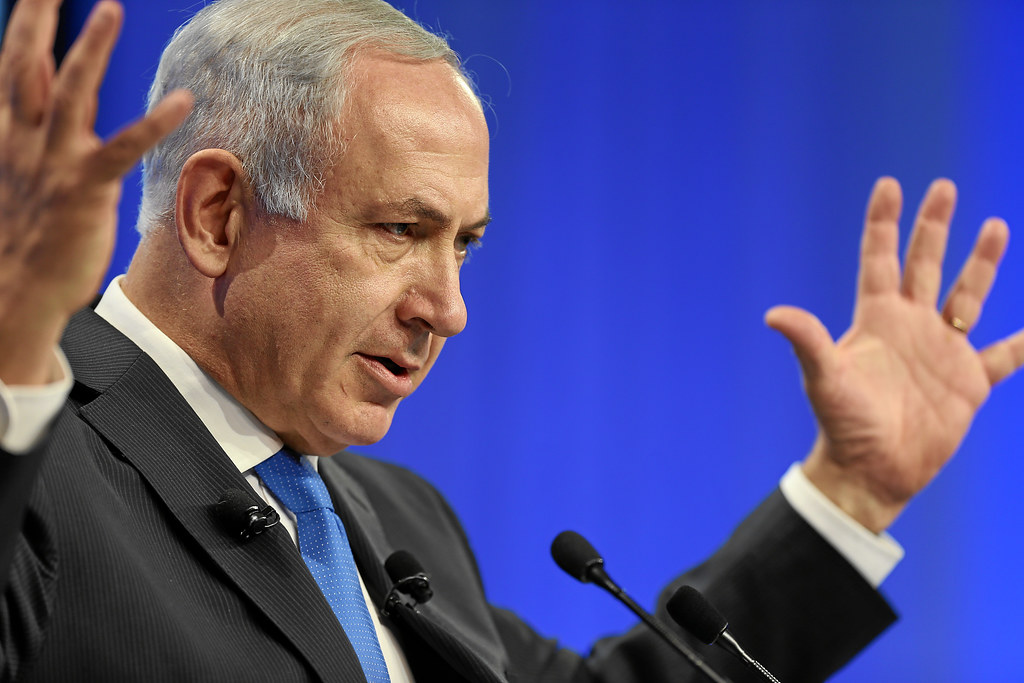Qatar’s mediation is ongoing in hopes of reaching a permanent ceasefire in Gaza while returning the remaining captives to their families.
Israel’s Prime Minister Benjamin Netanyahu reportedly accused Qatar’s mediation between Hamas and Israel of being “problematic” on Monday, despite the Gulf diplomatic broker’s numerous efforts that resulted in the release of captives from Gaza.
Netanyahu’s remarks came in a leaked recording by Channel 12 from a meeting between the Israeli prime minister and the captives’ families in Tel Aviv, where he claimed that Qatar funds Hamas — a claim that the country repeatedly dismissed.
“Qatar, from my point of view, is no different in essence than the United Nations… and the Red Cross, [Qatar] is even more problematic,” Netanyahu is heard telling the families in the leaked recording.
He added that he was willing to speak to anyone who would help return the captives.
“I have no illusions about them. They have leverage [over Hamas]… Because [Qatar] funds them,” Netanyahu added.
Hamas opened its political office in Qatar in 2012 following the United States’ request to establish a channel of communication, a move that has since allowed Doha to successfully mediate between the conflicting parties on several occasions to achieve crucially needed ceasefires.
The presence of the Hamas office has proven to be a key part of Qatar’s successful mediation since the beginning of the Israeli genocidal war on Gaza.
Qatar and Egypt had mediated a temporary truce that lasted between November 24 and December 1. The pause saw the release of at least 110 Israeli and foreign captives from Gaza as well as 240 Palestinian women and children from Israeli prisons.
Qatar — a major non-NATO U.S. ally — and France also managed to broker a deal on January 12 to allow the delivery of medicines to the remaining captives and civilians in Gaza.
Still, Netanyahu has appeared to be unsatisfied with Qatar’s role and the U.S. for its decision to extend its military presence at the Al Udeid Air Base, the largest in the region, for 10 more years.
Netanyahu can be heard saying in the recording that he got “very angry recently with the Americans” over their decision. He added that using the deal as leverage “would apply pressure” on Qatar.
Netanyahu is under immense domestic pressure from the captives’ families to return them to Tel Aviv as he rejected all calls to end the war in Gaza as others called for his resignation.
Israel has killed more than 25,000 Palestinians in Gaza throughout the genocidal war, 70% of whom are women and children.
Around 132 captives are still in Gaza, out of which at least 27 are believed to have been killed under the Israeli war on the Strip, according to an AFP tally compiled based on Israeli figures.
The captives’ family members had set up tents outside of Netanyahu’s private home this week in protest of their delayed release from Gaza.
Qatar, the U.S. and Egypt reportedly pushed for a deal involving the captives’ release from Hamas and a halt to the war in Gaza, the Wall Street Journal reported on Sunday, citing diplomats involved in the mediations.
Shortly after the report, Netanyahu said that he rejected Hamas’s demands as they involved a ceasefire — a demand that Israel has long rejected since the start of the war.
“If we agree to this, then our warriors fell in vain. If we agree to this, we won’t be able to ensure the security of our citizens,” Netanyahu said in a statement Sunday, despite sources saying the plan would involve the normalisation of ties between Israel and Arab countries, including Saudi Arabia.
Two Israeli officials then told Axios on Monday that Israel proposed, through Qatari and Egyptian mediators, a two-month pause to release the remaining captives and the bodies of those who died.
Beyond domestic pressure, Netanyahu is also at odds with the Israeli war cabinet over the war. Israel’s Walla news website reported on Saturday that military chief Yoav Gallant attempted to storm Netanyahu’s office in what almost led to a brawl.
The Hebrew report, widely cited by viral media including Al Jazeera, said Gallant would sometimes decline calls from Netanyahu’s office “for days.”
Latest on Qatar’s mediation
Qatar’s Spokesperson for the Ministry of Foreign Affairs, Majed Al Ansari, provided official updates on the Gulf state’s mediation efforts in Gaza on Tuesday during a weekly press briefing.
While Al Ansari expressed optimism over the success of Qatar’s mediation, he stressed that the “relentless escalation and intricate humanitarian situation” are affecting the process.
“If the war drags on, it will lead to further deaths and injuries, therefore work must be done for a durable ceasefire,” Al Ansari said, as cited in a readout by the Qatari foreign ministry.
The Qatari diplomat noted that media leaks “and remarks about displacement, rebuffing the two-state solution, and the continuation of war adversely affect the progress of these negotiations and subsequently lead to difficult discussions.”
He added, “The matter becomes more difficult with the increase of war pace, and Qatar’s position has not been negative from day one in its efforts, but offered numerous suggestions and reached an agreement in the previous pause, notwithstanding many entities that try to besmirch the reputation of Qatar.”
The Qatari official also publicly confirmed the visit of U.S. President Joe Biden’s senior Middle East adviser, Brett McGurk, to Doha, without providing further details on the discussions.
“Qatar is in a permanent engagement with the American side with ongoing visits and sharing perspectives about handling such types of crises […] pointing out that the visit comes within the framework of the unwavering engagements with many officials in the U.S. Administration, along with the Qatar-led mediation efforts,” the briefing’s readout added.







